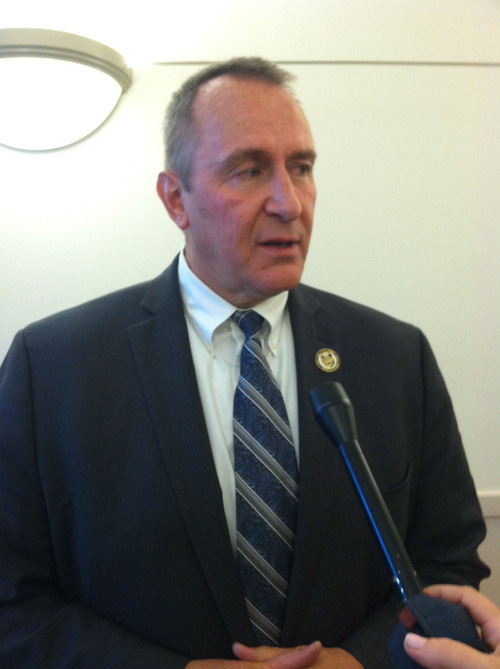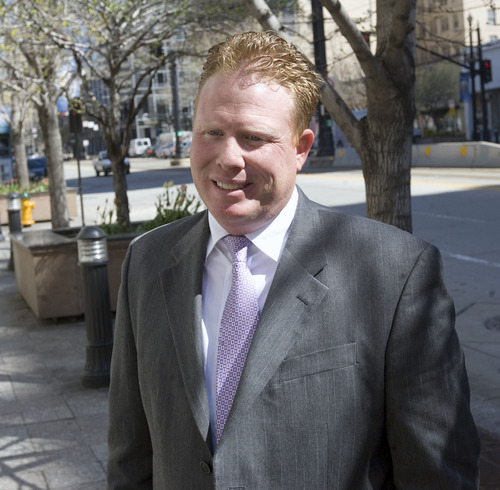This is an archived article that was published on sltrib.com in 2013, and information in the article may be outdated. It is provided only for personal research purposes and may not be reprinted.
Jason Brailow, cited by the Utah Division of Consumer Protection after 356 consumer complaints, contributed $22,600. The Tax Club kicked in nearly $100,000, all of it after being slapped by the state's fraud police.
Topping all donors, Jeremy Johnson's I Works and various associates shelled out more than $217,000. Johnson's company has been targeted by the state and now faces a federal lawsuit while Johnson himself is staring at 86 criminal charges.
All these donors and dozens more with regulatory histories gave money to the campaign accounts of then-Utah Attorney General Mark Shurtleff. In fact, a Salt Lake Tribune analysis shows that nearly 62 percent of Shurtleff's $1.9 million in donations from 2008 through 2012 came from individuals or companies with ties to online marketing, multilevel marketing, telemarketing, payday loans or alarm companies — all of which frequently draw the eye and ire of consumer watchdogs.
Indeed, more than 40 percent of political donations to Shurtleff from that period came from companies, business owners or associates who already had faced regulatory or legal action or who later became targets.
The analysis raises questions about the propriety of Utah's top cop accepting donations from companies and individuals who had either run afoul of state rules or worked in industries prone to regulatory crackdowns. The same questions apply to his fundraisers, including John Swallow, who would join Shurtleff's staff and succeed him as attorney general.
"It makes me wonder why so many companies are happy to donate to the attorney general, but not other statewide offices," said Sen. Todd Weiler, R-Woods Cross, who has suggested that legislators study whether the Utah Constitution should be amended so that the attorney general is appointed, rather than elected. "If it's just about good government, why aren't they giving to the auditor and treasurer?"
Attorneys general walk a tricky tightrope. They are politicians and prosecutors at the same time, said Meredith McGehee, policy director for the Campaign Legal Center in Washington, D.C.
"If they're taking money from an individual and then have to make a decision whether to prosecute that individual, is their judgment going to be compromised?" she asked. "Are they going to have second thoughts? Are they going to hesitate to move forward because it might cut off a good avenue of money they might need to run for office?"
Shurtleff and Swallow did not comment for this story. However, they previously denied ever tying campaign contributions to special treatment from the attorney general's office.
"I can go to my grave and face my God knowing that I never gave anyone special treatment or did anything inappropriate," Shurtleff has said. " ... Every time I got a campaign contribution, I said, 'You understand this has nothing to do with the job?' "
Swallow's campaign adviser, Jason Power, has said much the same thing, that Shurtleff and Swallow emphasized to contributors that their money would buy them no special favors.
Paul Murphy, a spokesman for the attorney general's office for a dozen years under Shurtleff and now Swallow, said he "cannot think of a single case where a donor to Mark Shurtleff received special treatment in an agency or enforcement matter."
"The governor, county attorneys and sheriffs also raise funds in partisan races and would face similar conflicts," Murphy said in a statement Saturday. "For example, Consumer Protection, UDOT, Purchasing and Public Safety and other agencies are also under the control of the governor. We would not suggest undue influence in the governor's office simply by virtue of a percentage analysis as you suggest with respect to Mr. Shurtleff."
On Wednesday, Marc Sessions Jenson, who is in prison on fraud charges, alleged that he had been "extorted" by Shurtleff and Swallow after the businessman ran into legal trouble. Receipts show Shurtleff and Swallow charged thousands of dollars of expenses at a luxurious California beach resort to Jenson.
Shurtleff denies Jenson's accusations, and Swallow points out his dealings with Jenson took place before he became chief deputy attorney general in late 2009.
Three other Utahns in online marketing recently said that Swallow suggested they would have protection in the attorney general's office in return for contributions to Shurtleff.
Online marketing emerged as the largest industry on Shurtleff's contributor list. Its companies, according to the Tribune analysis, provided about $462,000, nearly a quarter of his donations from 2008 through 2012.
Multilevel marketing companies came next, chipping in $354,000, about 19 percent of the total, followed by payday lenders at $109,000 (nearly 6 percent), telemarketers at $108,000 (about 5.6 percent) and alarm companies at $84,000 (nearly 4.4 percent).
A 2011 survey by the Federal Trade Commission identified the Internet as the most common vehicle for committing fraud and the place where about 40 percent of fraud-related purchases occurred. Telephones were used for 30 percent.
Among the top culprits: weight-loss products and work-at-home programs, marketed by several companies on the donor lists, including I Works.
Shurtleff's leading donor by far was Johnson's I Works, along with outfits and individuals associated with the online-marketing company. These companies and individuals gave $217,700 to Utah's attorney general. That's nearly 11.5 percent of his tally.
Shurtleff and Johnson were close. Shurtleff has flown on the businessman's plane and sat in his yellow Lamborghini.
The Utah Division of Consumer Protection issued citations based on consumer complaints against I Works in 2003, 2005 and 2007, at least two of them resulting in fines and requiring refunds, while two were dismissed.
In December 2010, I Works, Johnson and others were sued by the FTC, which accused them of receiving millions of dollars by billing consumers without proper authorization. Johnson also faced a criminal charge in 2011 that has since ballooned to 86 charges of bank fraud.
Johnson, under a federal judge's admonition not to talk to the news media, declined comment on why he had given or raised so much for Shurtleff. In the past, though, Johnson has defended his relationship with Shurtleff, saying the attorney general never asked him for anything.
Among other top donors:
• The law firm Siegfried & Jensen — along with two related firms and attorneys in them — gave $120,000, more than 6 percent of the total. Shurtleff was criticized for sending a lucrative contract to these firms to recoup Medicaid funds from drug manufacturers. Shurtleff's daughter at one time worked for Siegfried & Jensen.
• Usana Health Sciences and officials contributed $110,000, while Nu Skin International and officials chipped in nearly $90,000. Together, these multilevel marketers of nutritional supplements and personal-care products account for about 10 percent of Shurtleff's total. He backed a 2005 bill that some contended safeguarded their business model — one critics dis as pyramid schemes. Shurtleff praised Usana and the MLM business at a company convention.
• The Tax Club and its associates gave nearly $100,000, about 5 percent of the total. The Division of Consumer Protection cited The Tax Club in 2007. The FTC and Florida in January sued Tax Club operators and the company, which got its start in St. George, alleging it had scammed consumers out of $220 million.
• Professional Marketing International, related entities and associates donated nearly $45,600, about 2.4 percent of the total. Federal and state regulators have gone after these operations.
• Jason Brailow, his wife and some of his various companies contributed $22,600 (with $4,800 returned when Shurtleff did not run for the U.S. Senate), starting in 2008. Brailow and companies controlled by him had been cited in March 2006, before his donations, by the Utah Division of Consumer Protection. He also has been pursued by the FTC and the Illinois attorney general.
Brailow, one of the few donors to respond to an interview request, said his contributions had "no bearing, no effect whatsoever" on his relations with regulatory agencies.
• The political action committee for Mentoring of America, a telemarketing company, gave $32,500 to Shurtleff in 2008, according to its filing at the Utah lieutenant governor's office. Shurtleff's campaign listed $2,500 that year from the PAC. Beginning in 2004, the company has been cited four times by Utah regulators and once by the FTC. Despite the company's history, Shurtleff asked an aide in a Jan. 7, 2008, email to call Mentoring of America's headquarters in California and set up a lunch meeting with CEO Doug Gravink and COO Gary Hewitt.
"They will fly up here for the meeting (and bring me another $15K)," Shurtleff wrote in the email obtained through an open-records request.
In fact, disclosures by the company PAC show a $20,000 donation nine days after the email, with Shurtleff the only Utah candidate listed as receiving funds from the PAC in 2008. The Division of Consumer Protection cited the company in 2004, 2005, 2007 and 2009. The FTC sued it in 2009.
Rob Stahura, a Shurtleff fundraiser, once managed Mentoring's Utah office, where Tim Lawson, a Shurtleff friend and self-described "fixer," also once worked. Jenson mentioned both of them in his allegations of money flowing to Shurtleff.
It was a well-known practice among Utah's booming call-center industry, said former business owner Ryan Jensen, that if you wanted to thrive, you had to give money to Shurtleff and, after that, Swallow.
Jensen's business was the target of an investigation by the Division of Consumer Protection. He attended a Swallow fundraiser last year but did not contribute money.
"When we first got into this, in 2007, we were told from a group [in the industry] … 'Get some money together and we'll get you a round of golf with Shurtleff and you'll be fine,' " Jensen said in January. "All through my career in this industry, I've been told, 'Get with Shurtleff, get with Shurtleff.' "
Reporter Robert Gehrke contributed to this story.
Twitter: @TomHarveySltrib —
Meeting set
On Wednesday, the Utah Legislature's Government Operations Interim Committee is scheduled to discuss a proposal to study whether the state's attorney general should be elected or appointed. The meeting begins at 9 a.m. in Room 445. —
Join us for a Trib Talk
Reporters Tom Harvey and Robert Gehrke will join Trib Talk host Jennifer Napier-Pearce for a behind-the-scenes look at the ethics controversy involving Utah Attorney General John Swallow and his predecessor, Mark Shurtleff. Visit sltrib. com Tuesday at 11 a.m. for the live video chat.





